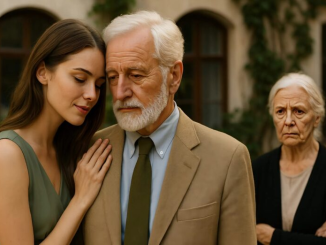It happened in the blink of an eye. One second my son was jumping off the porch steps, the next he was holding his wrist and trying not to cry in front of the neighbor kids.
I didn’t think it was broken. I honestly thought he was being dramatic—he’s usually the sensitive one, quick to tears when something doesn’t go his way. So I told him to shake it off, that it probably just needed some ice.
Two hours later, we were in urgent care. The X-ray tech didn’t even need to speak; I could see the clean little fracture clear as day.
While they wrapped him up, my son just stared at me. No tears, no whining, just quiet. That look did something to me.
It wasn’t about the wrist anymore. It was about how fast I brushed him off. How often I do.
But when we got home, he didn’t say a word about it. Not when I helped him change into his pajamas, not when I gave him extra dessert, not even when I tried to apologize in my own awkward, roundabout way. He just nodded, smiled a little, and went to bed early. I lay awake half the night, staring at the ceiling.
I kept hearing his voice from earlier that day, when he called me outside. “Dad, watch this!” Like every kid does, hoping someone’s looking. Hoping someone cares.
And I hadn’t.
The next morning, I tried to do better. I offered to help him get dressed, make his cereal, carry his backpack to the car. He waved me off, doing everything one-handed, even if it took twice as long. I could see the determination in his eyes.
He’s only seven. But that morning, he looked older. Like some part of him decided, right then and there, not to rely on me so much anymore.
That realization hit me harder than the diagnosis.
At work, I kept drifting off during meetings. Thinking about all the times I told him to “be tough” or “stop acting like a baby.” I thought I was helping him grow strong. But maybe I was just teaching him that his pain didn’t matter.
And I’d learned that lesson the hard way growing up.
My own father wasn’t much of a talker. If we got hurt, it was always, “Walk it off.” One time, I split my chin open playing baseball and he didn’t even stop the game. I sat on the bench bleeding into my glove until the final inning. I remember that silence more than any words.
I swore I wouldn’t be like him.
And yet, there I was—doing the same thing. Maybe in a softer voice, but the message was the same: “Toughen up.”
Later that week, something strange happened.
We were at the grocery store. I had let him push the cart, steering awkwardly with one hand, and he bumped into an older woman near the produce section. Before I could say anything, he looked up and apologized so sweetly, I saw her expression soften immediately.
“Are you okay, little one?” she asked, noticing the cast.
He nodded. “I broke it jumping off the porch. But it’s getting better.”
She smiled. “You’re brave.”
Then he said, “My dad said I was brave too… after he believed me.”
I froze.
She looked over at me and raised her eyebrows. It wasn’t judgmental, more like curious. I smiled sheepishly and shrugged.
But that little sentence stuck with me.
“After he believed me.”
Kids don’t need perfect parents. But they need to know they’re believed. That their feelings are valid, even when they can’t explain them.
That night, I told him a story I hadn’t shared before. About the time I broke my thumb in high school and my dad didn’t take me to the hospital for three days. How I swore I wouldn’t be like him. My son listened quietly.
Then he said, “Maybe Grandpa thought you were brave too. He just didn’t know how to say it.”
That stunned me.
He was seven. Seven. And already forgiving things that took me thirty years to understand.
The next weekend, we drove to my dad’s place. It was his birthday, and I hadn’t seen him in months. My son sat in the back seat, quietly humming to himself, eyes watching the trees roll by.
When we got there, my dad opened the door with the same gruff face he always wore, but when he saw the cast, something changed. He reached out and touched it gently.
“What happened, champ?”
My son said it again. “Jumped off the porch. Didn’t land right.”
Dad chuckled. “Bet that hurt.”
My boy nodded. “Yeah, but it’s okay now.”
There was this long pause. Then my dad said, almost too quietly, “You’re tough.”
I looked at him and realized that was the most tender thing I’d heard him say since I was a teenager.
Later, while they were building something out in the garage, I sat in the kitchen and talked to my stepmom. She said, “You know, your dad always talks about how proud he is of you. He just… doesn’t always have the words.”
That stayed with me.
I drove home thinking about how many generations of men were taught to keep it all in. To be strong, but not soft. Brave, but not vulnerable. And how we pass that down, even without meaning to.
The next week, I did something different.
I took the day off work and picked my son up early from school. We went to the park, just the two of us. No phones, no distractions. We sat on the swings for a bit, then walked around the lake.
At one point, he looked up and asked, “Dad, why did you believe me later and not sooner?”
I took a breath. “Because sometimes grown-ups mess up too. I was wrong, buddy. And I’m really sorry I didn’t believe you the first time.”
He didn’t say anything at first.
Then he leaned into me, resting his head against my side. “It’s okay. You believe me now.”
That moment—simple as it was—meant more than anything I could’ve bought him.
Over the next few weeks, I tried to keep showing up differently. Not just for him, but for myself. Slowing down. Listening more. Being present.
It’s funny how something like a broken bone can fix what’s been cracked for years.
A few months passed. His cast came off. He was back to running, jumping, climbing everything in sight. But he was also more confident, more open. Like something inside him had grown stronger—not just the bone, but his spirit.
One evening, he came into the living room with a drawing. “This is us,” he said. “When I broke my wrist.”
It was a stick figure of him with a big blue cast. And next to him, another stick figure—me—with a frown at first, then a smile.
“You were sad because you didn’t believe me,” he said, pointing to the first version. “But then you believed me, and you got happy.”
I laughed and pulled him into a hug. “I’ll always believe you now, okay?”
He grinned. “Even if I say I saw a flying dinosaur?”
I raised an eyebrow. “Especially then.”
He ran off laughing, and I just sat there holding the drawing, thinking about all the small moments I’d missed before. The way he’d say “watch me,” the tiny stories he’d tell that I half-listened to, the questions I shrugged off because I was tired or distracted or just… not fully there.
Kids are always paying attention. Not just to what we say, but to what we do when it matters.
The summer came, and we signed him up for a little gymnastics class. He wanted to learn how to land “properly” this time, as he put it. I stayed to watch every single session, even the long boring ones where they mostly just stretched.
And every time he looked over, I smiled and gave him a thumbs-up.
One day, after class, his coach came up to me. “He’s got great focus. And he always looks to you before he tries something new.”
That hit me again, in the best way.
Because being a parent isn’t about never messing up. It’s about being there—really being there—when it counts. And showing up even after you’ve gotten it wrong.
One afternoon in early fall, we went back to that same porch.
He stood at the top step, looked at me, and said, “Ready?”
I nodded.
He jumped—this time with a perfect landing.
Then he turned and said, “See? I did it.”
“You did,” I said. “Proud of you.”
He smiled and went back to doing it over and over, just for fun. But this time, I watched every single jump.
Every single one.
Sometimes the most important lessons come wrapped in moments we never asked for. Like a fractured bone or a silent look from a kid who just wanted to be heard.
I don’t think I’ll ever forget the way he stared at me in that urgent care room. Not because he was angry. But because he was disappointed—and trying to hide it.
That moment changed me more than any parenting book or podcast ever could.
And maybe, just maybe, that’s what healing looks like.
Not just for him—but for me too.
So if you’re a parent, or someone who loves a kid, or even just someone who remembers what it was like to be that kid… slow down. Listen. Don’t brush things off too quickly.
You never know which moment might be the one they remember for the rest of their life.
And if you’ve ever made a mistake like mine—there’s still time to make it right.
They might forgive you faster than you think.
Thanks for reading. If this story resonated with you, share it with someone who needs to hear it. And don’t forget to like—it helps more people see stories that matter.






Leave a Reply